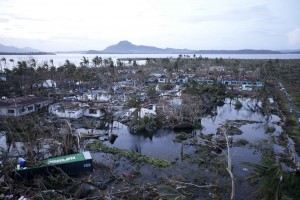FAO appeals for assistance to Visayas farmers

The UN food agency on Wednesday called for “urgent assistance” to farmers in the Visayas who need to sow new seeds.
“Regions most severely affected by the typhoon account for one-third of the total rice production in the country,” the UN Food and Agriculture Organization (FAO) said in a statement. “Hundreds of thousands of farmers in the Philippines whose crops were destroyed by [the typhoon] need urgent assistance to sow new seeds before the end of the current planting season.”
Dominique Burgeon, head of FAO’s Emergency and Rehabilitation Division, said in the statement: “If we want to avoid entire regions of the country having to rely on food aid, we need to act now to help vulnerable families to plant or replant by late December.” The agency plans to supply seeds for rice and maize as well as tools, fertilizer and irrigation equipment, it said.
“Families will also receive vegetable seeds to help bridge the gap before the next harvest,” it added.
Preliminary estimates from the United Nation’s food agency showed that the typhoon that hit the Philippines has caused crop losses worth $110 million and inflicted damage to the agriculture sector of more than twice that figure.
The combined effects of typhoons “Santi” and “Yolanda” robbed the Philippines of an expected bumper palay harvest for this crop year, with the forecast output slashed by 900,000 metric tons to 18 million MT, according to FAO.
The Rome-based agency said in a report that it has reduced its forecast on the country’s rice production because “Santi” ravaged northern Philippines last October, when the harvest for this year’s main crop was well under way.
Wet-season harvests account for 55 percent of the Philippines’ yearly rice production.
On the other hand, Supertyphoon “Yolanda” razed the central Philippines while some provinces were still harvesting the main crop and others have started planting for the secondary crop, which was due for harvest in early 2014.
In its latest Global Information and Early Warning System (GIEWS) report, the FAO said it reduced its forecast for Philippine rice output “pending a more detailed assessment.”
The GIEWS is an arm of the FAO mandated to issue reports on the global food supply situation and to provide early warnings on possible food shortages.—With wire reports
